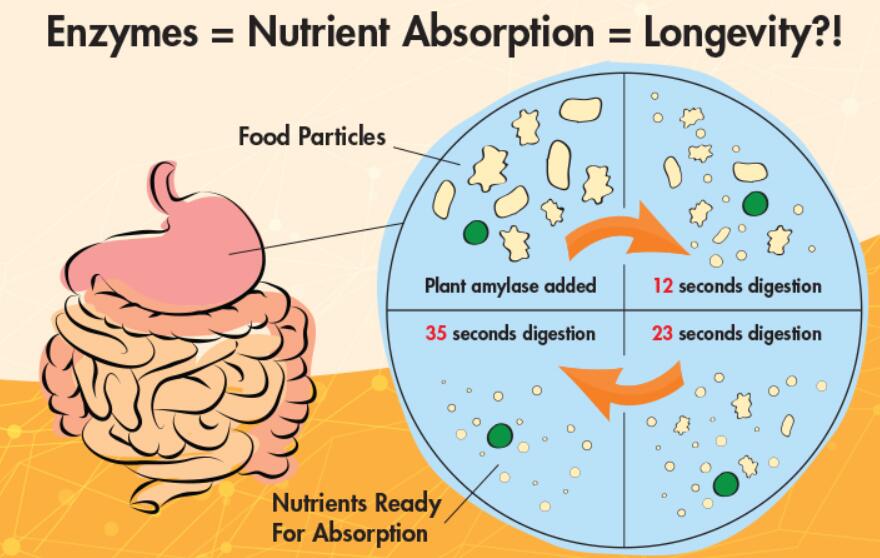Nutrition, Physiology
How To Enhance Digestive Enzymes
2 Signs of Enzyme Deficiency That You Can’t Miss!
Digestive enzymes unlock the nutrients in your food. They are categorized by the macronutrients that they release—proteins, carbohydrates, and fats.
Raw foods are naturally rich in enzymes.
Vegetables and fruits contain plant enzymes that assist with their own digestion. Raw dairy also contains enzymes that help the body to break down milk sugars, which are often difficult to digest.
The modern diet is—for the most part—missing these important nutrients.
Enzymes are extremely sensitive to their environment. Heat and chemicals can denature an enzyme, or destroy its ability to unlock nutrients. Because of heavy processing, pasteurized and packaged foods often lack active enzymes. This means that the body must work harder than ever to break down and synthesize these foods.
The result?
As it turns out, the root of many digestive complaints is enzyme deficiency. This includes gas, bloating, abdominal pain, nausea, and heartburn.
You may be enzyme deficient because you are unable to synthesize enough enzymes to break down the food that you eat. Or, you may be deficient in enzymes because your body is unable to activate the enzymes necessary for digestion.
 You could be deficient in enzymes if your body isn’t able to activate the necessary enzymes for digestion. Symptoms like abdominal pain, skin rashes, brain fog, and mood swings are all signs of enzyme deficiency.
You could be deficient in enzymes if your body isn’t able to activate the necessary enzymes for digestion. Symptoms like abdominal pain, skin rashes, brain fog, and mood swings are all signs of enzyme deficiency.
Digestive trouble is not the only thing to worry about when you are missing enzymes. Often, there is a constellation of symptoms that can involve:
- Skin rashes, acne, and eczema
- Brain fog, headaches, and mood swings
- Joint and myofascial pain
When it comes to enzyme deficiency, look for these telltale signs:
- Bacterial overgrowth in the small intestine (also known as SIBO)
- Trouble digesting fatty foods
BACTERIAL OVERGROWTH IN THE SMALL INTESTINE
Poor food combining and overeating can overwhelm the digestive system.
A meal that does not combine correctly—like meat and starchy potatoes— can give the digestive system mixed signals about which digestive juices and enzymes to release.
In the stomach, this can mean that enzymes never get activated. A high pH (or gastric juices that are alkaline) will not trigger pepsin, an enzyme that is essential for the complete digestion of food proteins.
In the small intestine, we see a “traffic jam.” Food particles stagnate. The bacteria that normally move through the small intestine also stagnate and begin to feast on the ready supply of food. The small intestine grows acidic. This is what is known as small intestinal bacterial overgrowth, or SIBO.
When bacteria overrun the small intestine, problems quickly arise. This is because the small intestine is meant to smoothly shuttle food and bacteria from one end of the digestive tract to the other.
The pancreas releases enzymes called brush border enzymes. Brush border enzymes keep food and bacteria moving. They require an alkaline environment. When the small intestine becomes too acidic, this environment can denature—or turn off—enzymes.
Up to 40% of people without enough pancreatic enzymes also have bacterial overgrowth.
If you have bacterial overgrowth in the small intestine, you may:
- Feel heavy, bloated, sluggish, and even have cramping pain after meals
- Suffer from heartburn
- Have myofascial pain, like fibromyalgia
DIFFICULTY DIGESTING FATS
If you are unable to properly digest fatty foods, you may want to look to your pancreas and not only your gallbladder.
Signs of pancreatic enzyme deficiency or inactivity include:
- Bloating or cramping pain after meals
- Loose, greasy, foul-smelling stools
- Deficiency in fat-soluble vitamins A, D, E and K
Research tells us that pancreatic enzymes do much of the heavy lifting when it comes to breaking down fats. If you are deficient in pancreatic enzymes or if they are inactive, you may have trouble digesting fats.
The enzyme responsible for digesting fats is lipase. Lipase has a short life in the small intestine and is sensitive to its environment. Besides having a short life, if the small intestine is too acidic, lipase does not do the job it was designed to do.
While you may intuitively remove hard-to-digest fats from your diet, studies show that fats in the small intestine actually prolong the life of the enzyme lipase. In other words, carefully chosen fats can enhance your digestion of fatty foods.
7 TIPS TO GET RID OF ENZYME DEFICIENCY
1. Use an enzyme supplement: Assist Full Spectrum, Assist SI, and Assist Dairy and Protein are all specifically designed to support healthy digestion in the stomach and the small intestine.
2. Try the Body Ecology Principle of Food Combining: Pair non-starchy vegetables and ocean vegetables with protein. Non-starchy vegetables and ocean vegetables do not require a strong alkaline nor a strong acidic condition to digest properly.
3. Try the Body Ecology Principle of 80/20: Leave a little room in the stomach (about 20%) for digestive enzymes to do their job.
4. Drink water alone: Because water can dilute your digestive enzymes, drink room-temperature water between meals.
5. Drink ginger tea: Research has found that ginger root has the ability to stimulate brush border enzymes and increase the activity of pancreatic enzymes. Drink ginger tea after meals or before bed for the best results.
6. Cook and prepare foods with coconut oil: Coconut oil contains medium-chain triglycerides, which are directly absorbed. Coconut oil can stimulate the enzyme lipase—making fats easier to digest.
7. Make cultured vegetables a part of every meal: Cultured vegetables are naturally brimming with enzymes that enhance digestion.


